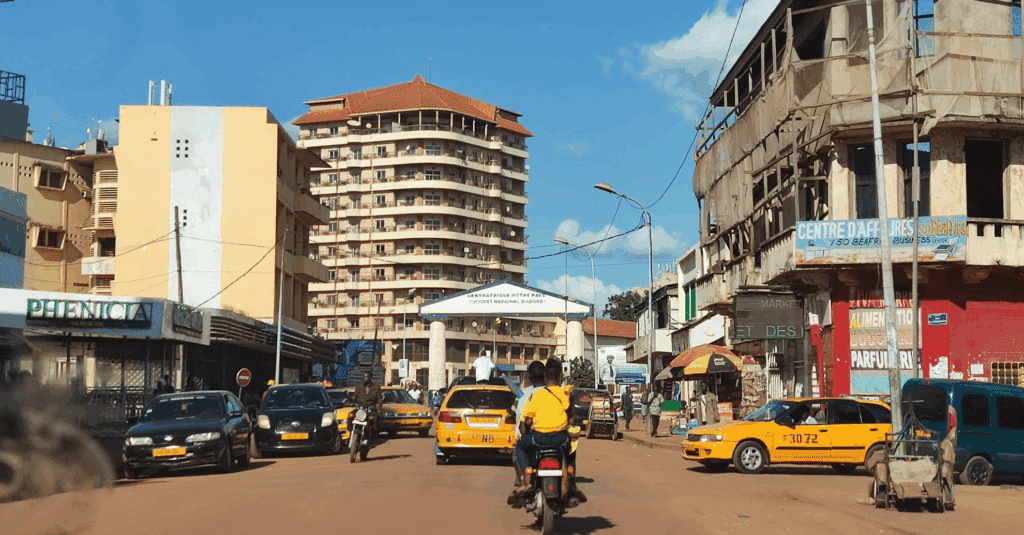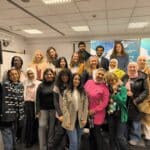
Human rights defenders (HRDs) in the Central African Republic play a central role in promoting peace, consolidating the rule of law, and defending fundamental freedoms. Despite their crucial commitment, these actors operate in an environment characterised by insecurity, stigmatisation, a lack of effective protection mechanisms, and the still embryonic structure of their initiatives, particularly in regions far from the capital.
To support them, Avocats Sans Frontières, in partnership with the NGO URU and the Francophone Institute for Justice and Democracy (IFJD), is implementing the ‘Gbou Kôkô (Defend)’ project, with financial support from the European Union. The overall objective is to promote and protect human rights by strengthening the capacities of HRDs and supporting their structuring. The project covers Bangui, Bouar and Bambari, with a particular focus on their outskirts, which are often neglected by traditional projects.
An innovative approach based on local dynamics
The uniqueness of the Gbou Kôkô project lies in its approach, which is deeply rooted in community realities, and in its desire to break away from the traditional channels of the most visible and institutionalised CSOs. The approach is based on a deep and evolving understanding of the dynamics of Central African civil society, where many human rights defenders act in isolation, without always recognising themselves as such, and sometimes perceive this mission as a privilege reserved for an elite or a restricted circle of civil society actors.
Gbou Kôkô deliberately positions itself outside the beaten track, promoting:
- Actors who are not affiliated with formal structures but are recognised for their local engagement;
- Diverse initiatives emerging from diverse community contexts, often below the institutional radar;
- Marginalised geographical areas, such as the country’s interior, where citizens’ voices struggle to be heard.
This approach makes it possible to identify, train and support isolated but committed HRDs, whether they are members of local committees, community leaders or ordinary citizen volunteers.
The project has trained more than 150 HRDs, nearly 40% of whom are women, through sessions held in Bambari, Bouar and Bangui. The modules covered the concepts of human rights, monitoring, data collection, advocacy and analysis of civic space.
One notable point: the beneficiaries said that they did not initially identify themselves as HRDs, a role they thought was reserved for members of formal organisations. The project therefore, supported a broader awareness of the role that everyone can play in defending rights.
Creation of a monitoring system
One of the major advances of the project is the collective development of a tool for monitoring human rights violations, with a participatory process involving focal points, field workers, and human rights defenders. The deployment of adapted forms and the use of Kobo Collect enabled the reporting of just over 150 cases of violations in March 2025, which were classified and analysed.
This data feeds into a documentation database that is a valuable resource for the development of collective advocacy based on evidence (evidence-based approach).
Development of locally-based advocacy actions
Advocacy and awareness-raising initiatives emerged directly from the training sessions and were ultimately supported by small grants, giving rise to micro-projects that will be directly implemented by HRDs in 2025. In Bouar, HRDs decided to tackle sexual violence in schools and problems of access to civil documents for marginalised communities. In Bambari, they targeted road harassment by internal security forces (police, gendarmerie) and its economic consequences on the population. In Bangui, the HRDs have decided to work on sexual violence in schools, access to education for young girls, and violations committed by the defence and internal security forces.
At the same time, in Bangui, the proposed law on the protection of HRDs is being monitored, involving dialogue with institutions and parliamentary networks.
The Gbou Kôkô project illustrates how a local, inclusive, and flexible approach can sustainably strengthen the capacities of human rights defenders, especially at the provincial level, with local initiatives led by the HRDs themselves. By promoting invisible actors, moving away from traditional partnerships and relying on rigorous documentation, it lays the foundations for a more representative, structured civil society that is better able to influence change.
The results obtained, although there is room for improvement, show that it is possible to support a bottom-up advocacy dynamic, driven by HRDs who now have a better understanding of their role and their power to act.



